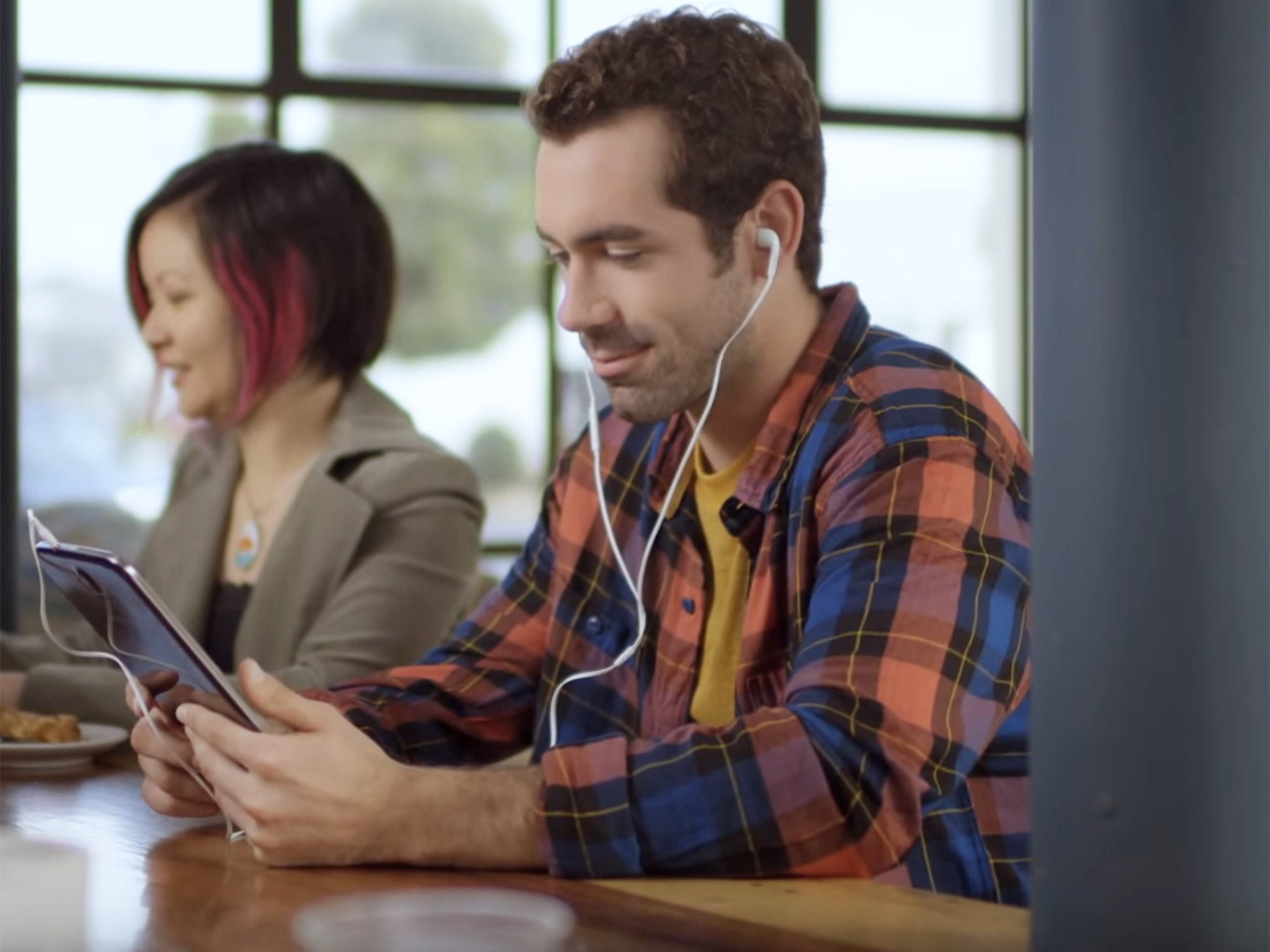Are soundtracked books a stunt or the future of ebooks?
Have your heard about the latest thing in publishing? 'Soundtracked' books are gaining ground in a crowded ebook market, tempting readers with interactive features. Alex Lawson speaks to one of the genre's leading lights, and gives his verdict on listening in

Your support helps us to tell the story
From reproductive rights to climate change to Big Tech, The Independent is on the ground when the story is developing. Whether it's investigating the financials of Elon Musk's pro-Trump PAC or producing our latest documentary, 'The A Word', which shines a light on the American women fighting for reproductive rights, we know how important it is to parse out the facts from the messaging.
At such a critical moment in US history, we need reporters on the ground. Your donation allows us to keep sending journalists to speak to both sides of the story.
The Independent is trusted by Americans across the entire political spectrum. And unlike many other quality news outlets, we choose not to lock Americans out of our reporting and analysis with paywalls. We believe quality journalism should be available to everyone, paid for by those who can afford it.
Your support makes all the difference.The rustle of paper and the musty aroma of tightly packed pages is key, for many readers, to the appeal of picking up a physical book rather than a digital one, but Brits may just have found something equally sensuous.
Soundtracked books – ebooks with sound effects – started appearing on sale four years ago, but exclusive research from the market leader, Booktrack, shows Britain is now the second-keenest nation, after the US, to wrap its eyes and ears around this revamped medium. The new study shows the total number of people in Britain using the medium has increased 13 times since July, and reveals the Booktrack app has 2.5 million users worldwide.
Soundtracked books haven't been whole-heartedly welcomed by book buyers, though. Predictably, traditionalists have insisted that piped-in sounds distract from the written word and stamp on the imaginations of readers. One publishing insider told The Independent: "Readers want to immerse themselves and let their imagination run free, not be bombarded with interferences."
But those in the pro camp make a strong argument. A study conducted by New York University, Reading with Sound, found that concentration levels actually benefited from the immersive experience. Paul Cameron, founder of the New Zealand-based Booktrack and the man who is dedicated to changing the way we read, says: "We have created a new entertainment medium that has not been encountered before, simply because the iPad didn't exist. Books are the only mainstream medium without synchronised sound but it really lifts the experience." On first listen, that experience appears to be a string of sound effects stuck together. Reading Dracula, my ears are greeted with the braying of horses, the crack of gunshots and startled cries. Trying it out as I sit beside Cameron in a busy London café with background noise audible over headphones, it feels more like trying to concentrate on a dot in the distance while the Rio Carnival rages in my peripheral vision.
But when I use the service in more leisurely environs, it presents a totally different experience. As Sherlock Holmes (one of Booktrack's most bankable assets) banters with Dr Watson by the fireside, the crackle of the flames seems to send warmth through the cold gleam of the iPad. Similarly, Toto's barking and the howl of the swirling winds that transport Dorothy to Oz in L Frank Baum's classic add atmosphere to a familiar tale as I read it travelling on a train through rugged Cumbria. For much of the prose, classical music plays and the same devices used in films are evident (sharp strings for tension, sweeping brass for long journeys through epic vistas). The app measures your reading speed to work out when to play the correct effects.
The medium has delighted self-publishers who have risen to prominence as ebooks have broken down the barriers to publishing. Fan fiction is one of the biggest categories in Booktrack's 16,000 titles and users are encouraged to use its stock sound effects – recorded by Peter Jackson's Lord of the Rings team – to "illustrate" their work, but they can also create their own. Cameron plans to add actual songs in future. "My dream is to have Lorde accompanying Hunger Games or Taylor Swift soundtracking a teen romance title," he says, adding that enthusiasts have been pairing music with reading for a long time (personally, the incongruous mix of Daphne du Maurier and electronica outfit Boards of Canada are perfect together).
For publishers, soundtracked books can provide a lively, marketable new revenue stream – and new opportunity to get more from their back catalogue. Prices are typically a little more expensive than ebooks, which in general have suffered something of a slowdown. The consumer research body Nielsen reported that ebooks' share of the UK books market jumped from 21 per cent in 2012 to 32 per cent in 2014, but fell back to 29 per cent in 2015. They were hindered by the phenomenal growth in physical adult colouring books and a lack of blockbuster young adult-fiction titles, which tempt adults to read books aimed at a more youthful audience (John Green's The Fault in Our Stars was an ebook blockbuster). Erotic fiction, led by EL James's Fifty Shades of Grey, continues to provide an ebook banker as the anonymity of what those getting hot under the collar are reading in public appeals.

In its study Who's Afraid of the ebook Plateau? Nielsen found that readers have changed their views and habits in just a few years. The decline in the tablet and ereader market is shown by the fate of Amazon's Kindle, where shipments have rapidly slowed. In the UK, the Waterstones chief executive James Daunt ruffled feathers when – having dubbed Amazon a "ruthless devil" in 2011 – he reluctantly got into bed with said Satan a year later to sell Kindles. But this year Daunt admitted sales had been "pitiful" and pulled the devices out of stores. "We have gone almost as far as we can with what we have got. The heavy book buyers like it as they can take it on holiday and the Tube. Now the next thing is to take it beyond what the printed book can offer," says Neilsen's Jo Henry.
So if ebook popularity has faded slightly, how have soundtracked books captured a growing market? Their growth, it seems, goes hand in hand with a resurgence in audiobooks and podcasts. Both have been given a leg up by improved access through iTunes and landmark releases such as the now-classic Stephen Fry-read Harry Potter series and true-crime genre-reinventing podcast Serial. It appears that we still want in-depth, long-form stories, simply in new and different ways from the printed page alone. Some 10 per cent of those surveyed by Nielsen said that they were willing to pay extra for new and interactive ebook features.
One group rushing into the soundtracked books market are teachers. Booktrack, which is backed by the PayPal founder Peter Thiel, has more than 12,000 schools signed up to its classroom service and it claims pupils using the service read for 30 per cent longer, scoring 17 per cent higher on comprehension tests.
Will books without soundtracks one day seems as archaic as silent films? It seems unlikely, but the rise of soundtracked books speaks volumes about the way we like to be informed and entertained in an increasingly digital world.
Join our commenting forum
Join thought-provoking conversations, follow other Independent readers and see their replies
Comments